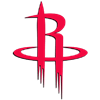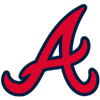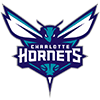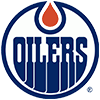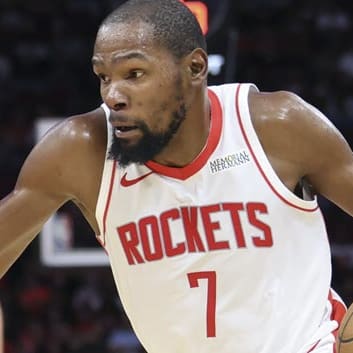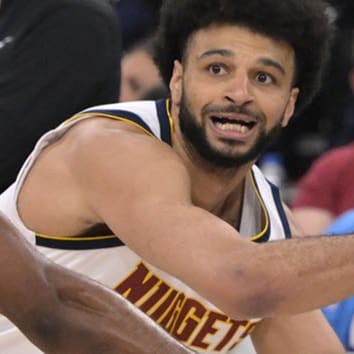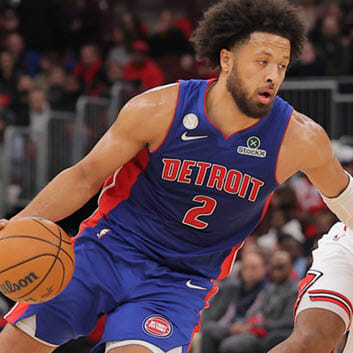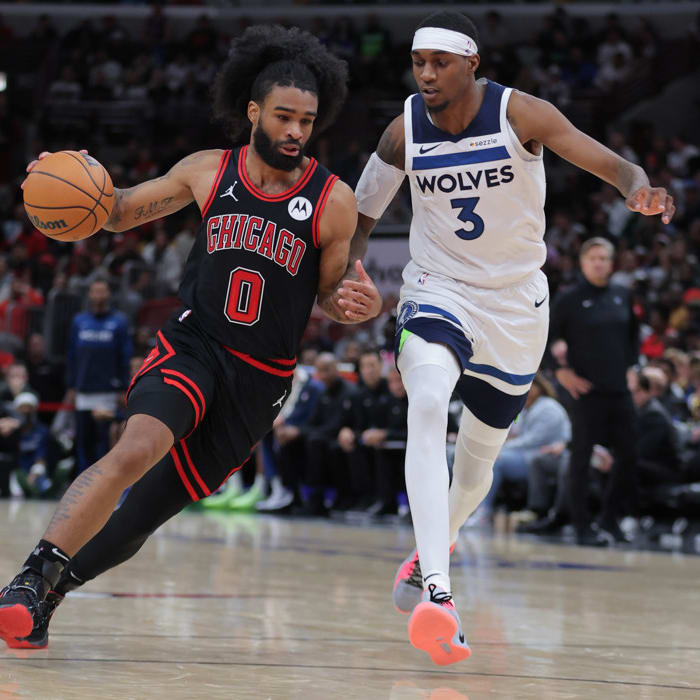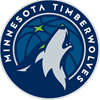 STATE OF THE FRANCHISE
STATE OF THE FRANCHISE
For the second time in the last decade, Minnesota traded a superstar named Kevin to allow him to chase a championship as part of a Big Three on a different team. The Timberwolves could have tried to play out Kevin Love's contract, but they struck while the iron was hot and brought in a great group of players for Love. They received the last two number one draft picks from Cleveland – Andrew Wiggins and Anthony Bennett – in addition to the last remnant of the pre-Sam Hinkie Philadelphia 76ers, Thaddeus Young. The Timberwolves will certainly miss Love's production, but could this be a case of addition by subtraction? In his return to the bench, coach Flip Saunders has a number of interesting pieces to work with. It'll be up to Saunders to get the puzzle pieces to mesh together.
PLAYING TIME DISTRIBUTION
The starting lineup should be fairly well set at all five positions. Ricky Rubio is the starting point guard with Kevin Martin providing offense at the two. Andrew Wiggins should start before too long at the small forward with Thaddeus Young at power forward (even though Young is really only a small-ball four). Nikola Pekovic will start at center. If all five remain healthy, they should hover around at least 30 minutes apiece. Pekovic hasn't played a full season in his career, which gives Gorgui Dieng value. The former Louisville center could also play some power forward as a kind of high-post center next to Pekovic. Ronny Turiaf will sub in to give the team a defensive anchor. At 6-8, Anthony Bennett does not have prototypical power forward size, but he has enough bulk to battle in the paint and could be used as a stretch four. If Saunders doesn't feel like Wiggins should start from the opening tip, Corey Brewer could start at small forward for a short time. Brewer and Chase Budinger will provide wing support and get more playing time depending on the situation (Brewer for defense, Budinger for offense). In Mo Williams, Minnesota has a veteran backup point guard who can provide more shooting than Rubio.
PLAYER OUTLOOKS
Centers
Nikola Pekovic: Pekovic is entering his fifth season with the Timberwolves which makes him the longest tenured player on the team. The 6-11 center from Montenegro is coming off his best season, and the only thing that is hampering his status as an upper-tier center is his health. Pekovic missed 28 games, including the end of last season, with an ankle injury. While he was on the court, he provided a career-high 17.4 points (on 54 percent from the field) with 8.7 rebounds in 31 minutes per game last season. The 28-year-old also hit 75 percent of his free throws, and added 0.9 assists, 0.6 steals, and 0.4 blocks. On defense, Pekovic is more of a space eater than a rim protector, which wouldn't be a problem if the Timberwolves had someone else to block shots. With his former partner in the paint, Kevin Love, now out of town, Pekovic may find even more low-post opportunities. The offense will no longer be so focused on Love, but Pekovic will still have to share the ball with players like Thaddeus Young and Andrew Wiggins. The key to the big man's success in 2014-15 will be his ability to stay healthy. He has missed at least 17 games in each season due to a variety of issues. Based on his ability to score, rebound, and shoot efficiently, Pekovic could be a top center if he can stay on the court for a handful of more games this season.
Gorgui Dieng: Dieng came on like gangbusters at the end of the 2013-14 season. After languishing on the bench for the first four months of the season, Dieng showed that he could be an impact rebounder and scorer at the center position. In a seven-game stretch in March, Dieng had five double-doubles, including an eye-opening 22-point, 21-rebound performance in a March 20 loss to the Rockets. The former Louisville Cardinal added four more double-doubles in April, including another 20-rebound game against Houston. For the season, Dieng averaged 4.8 points, 5.0 rebounds, 0.7 assists, 0.5 steals, and 0.8 blocks in 14 minutes per game. He converted 50 percent of his field goals and 63 percent from the charity stripe. It remains to be seen whether the native of Senegal can play next to Nikola Pekovic, who was out with an ankle injury during Dieng's period of productivity. The second-year pro will be in the mix for minutes alongside and behind Pekovic. If coach Flip Saunders determines that Anthony Bennett and Thaddeus Young can't start at power forward, Dieng could be in line for starter's minutes.
Ronny Turiaf: Turiaf may have found a home after spending most of his career as an NBA vagabond. The 6-10 center appeared in six different uniforms before joining Minnesota prior to the 2013-14 season. Ankle and elbow injuries limited Turiaf to 31 games with the Timberwolves last season, but he showed that he still possesses an NBA skill – low-post defense – even in limited action. In 20 minutes per game, Turiaf averaged 4.8 points, 5.6 rebounds, and 1.6 blocks. Offense has never been Turiaf's calling card, though he did hit nearly 60 percent of his shots (mainly coming off of offensive rebounds). Unfortunately, he squanders his chances at the free-throw line (42 percent on freebies). Turiaf had a nice run in early February before getting hurt. In eight games as a starter, he averaged 5.4 points, 7.1 rebounds, and 3.0 blocks in 28 minutes per game. Those numbers may represent the peak of his production, but his rim protection could come into play for Minnesota this season as the team looks for a shot blocker to play next to Nikola Pekovic. Turiaf's presence on the team may also allow coach Flip Saunders to limit Pekovic's minutes in order to help the keep starter healthy.
Forwards
Thaddeus Young: Young came to Minnesota from Philadelphia as part of the Kevin Love trade. The 26-year-old forward spent the first seven years of his career with the 76ers and averaged at least 12.7 points in the last six of those seasons. He started 78 games for Philadelphia last year and provided a career-high 17.9 points despite reduced efficiency from the field for a losing team. He hit a career-low 45 percent of his field goals and just 31 percent of his three-pointers for 1.1 three-pointers per game. Young did bounce back with 71 percent from the charity stripe after converting only 57 percent from the line in 2012-13. While Young may need to rein in his shooting with his new team, he should be a key cog for coach Flip Saunders' offense. The green light from the perimeter may be turned off. Young only attempted 12 three-pointers in 2011-12 and 2012-13 but launched a career-high 229 long-range shots under the new Philadelphia regime last season. His field goal percentage should bump back to his career average of 50 percent, and he should be among the team's leading scorers with Kevin Martin. While Young will not replace all of Love's offensive output or board work, he may provide better defense and enough points to help the team win.
Andrew Wiggins: Wiggins came to Minnesota as part of the trade that sent Kevin Love to Cleveland. One of the most hyped prospects in recent memory, Wiggins will get to grow with the Timberwolves who hope that he is the next superstar wing. The Canadian-born forward spent one year at Kansas, where he averaged 17.1 points and 5.9 rebounds. Wiggins showed off incredible athleticism and a nose for the ball in college. He could be an excellent offensive rebounder for his position. While he hit just 34 percent of his three-pointers, he has fluid form and should improve from long range as he matures. Other than his currently inconsistent perimeter shot, Wiggins also lacks ball-handling skills, and he tends to drift in games (highlighted by his four-point effort as Kansas lost to Stanford in the NCAA tournament). He scored at least 20 points four times last season, including 41 points in a loss to West Virginia on March 8. Wiggins' point production may be spotty as a rookie, but he will get plenty of playing time and should be matched up defensively against the opponent's top scorer. The rookie may not be able to live up to the hype bestowed upon him, but he should be a quality player who could grow into a superstar.
Corey Brewer: Brewer returned to Minnesota in 2013-14 after a little more than two seasons away. Following his first stint with the Timberwolves, Brewer came off the bench for the Mavericks and Nuggets. He returned as a starter to the Timberwolves, starting in 81 games last year and averaging 12.3 points, 2.6 rebounds, 1.7 assists, and 1.9 steals. Brewer is a terrible three-point shooter (28 percent last season for 0.7 three-pointers made) but does pretty well within the arc (career-high 48 percent from the field overall last season). He hit 72 percent of his free throws. Brewer won't be able to leak out on the break to receive full-court outlet passes from Kevin Love this season, but he may serve as a defensive tutor for fellow wing Andrew Wiggins. The former two-time NCAA champion at Florida will also likely see his minutes cut with competition from Wiggins, a return to health from Chase Budinger, and the addition of Thaddeus Young to the squad. Because of all of these factors, Brewer should take a dip in fantasy value and only be drafted in deeper leagues or if some of the competition falls away due to injury.
Anthony Bennett: Bennett's first season in the NBA with Cleveland was what could be considered a disaster. Fortunately, the 21-year-old Canadian gets a quick second chance because he was part of the blockbuster trade that sent Kevin Love to the Cavaliers and Bennett, Andrew Wiggins, and Thaddeus Young to Minnesota. The 6-8 Bennett was coming off of shoulder surgery entering his rookie season. He had additional issues with sleep apnea and never found a consistent role with Cleveland. Bennett appeared in 52 games and averaged 4.2 points, 0.3 three-points, 3.0 rebounds, 0.3 assists, 0.4 steals, and 0.2 blocks in 13 minutes per game. He converted just 36 percent of his field goals, 25 percent of his three-pointers, and 64 percent of his free throws. Bennett's 6-8 height and willingness to take three-pointers may suggest that could handle a role as a small forward, but his best position in the NBA will likely be at power forward. Even if he trims a few pounds off his 259-pound frame, he has a wide body that can help Minnesota control the boards. Bennett could start next to Thaddeus Young in the frontcourt or continue to get minutes off the bench. The second-year pro should be monitored in the early season for signs of a breakout. He still has a great deal of potential.
Chase Budinger: Budinger's two-year stint with the Timberwolves has been plagued by a litany of injuries. In 2013-14, he was limited to 41 games by knee and ankle ailments (after only playing 23 in 2012-13). When he was on the court, the sixth-year forward averaged 6.7 points, 1.0 three-pointers, 2.5 rebounds, 0.8 assists, and 0.5 steals in 18 minutes per game. He hit a career-low 39 percent of his field goals but took nearly half of his shots from three-point range, from which he converted 35 percent of his shots. Budinger also converted 82 percent of his free throws. Offseason reports have had Budinger feeling better than at any time since he left Houston two years ago. While the injuries have robbed the 6-7 forward of some of his athleticism, he could provide some perimeter support for Minnesota in 2014-15. Budinger will likely serve as a backup to Andrew Wiggins, which should be a role he is accustomed to since he has started just 17 percent of his games. Even in limited minutes, Budinger has hit at least 1.0 three-pointer in each of his five seasons. With a bit of luck in the health department, Budinger could be a useful three-point streamer for fantasy owners.
Glenn Robinson: Robinson was taken by Minnesota in the second round of the 2014 NBA Draft. The 6-7 forward spent two successful years with the Michigan Wolverines (playing in 76 games) and showed excellent athleticism at the NBA draft combine. At Michigan, Robinson averaged 12.0 points but never led the team in scoring. He hit 31 percent of his three-pointers but excelled near the basket by hitting 60 percent of his 2-point shots (reminiscent of his father, the first-overall pick of the 1994 NBA Draft). Robinson had a tendency to drift in and out of games while teammates like Trey Burke and Nik Stauskas took over. He did score in double digits in 12 of his last 13 games and hit a career high of 23 points twice in his sophomore season. If he can channel his athleticism into viable NBA skills, Robinson could be a future sleeper. As a rookie, Robinson will likely spend at least part of the season in the D-league since Minnesota seems fairly deep at small forward. (Andrew Wiggins, Chase Budinger, and Shabazz Muhammad should all be ahead of Robinson on the Timberwolves depth chart.)
Robbie Hummel: Hummel spent the majority of the 2013-14 season coming off the bench for the Timberwolves. He appeared in 53 games (starting five) and averaged 3.4 points on 38-percent shooting from the field, 36 percent from beyond the arc, and 94 percent from the line. Hummel spent five years at Purdue and a season in Spain before arriving in Minnesota. He tore his ACL twice in college and injured his MCL while in Spain (where he had to sit out for two months). With the team struggling to cope with other injured players, Hummel received major playing time in April. He played at least 30 minutes in four games and scored a career-high 12 points in the April 5 loss to the Magic. The 6-8 forward scored in double digits in three other games during his rookie season. At 25 years old, he can provide hustle in limited minutes. At Purdue, before his major injuries, Hummel was a nice scorer and did a lot of little things to help the Boilermakers win. He could find a reserve role for the Timberwolves, but his minutes will be limited by his status on the depth chart.
Guards
Ricky Rubio: For the first time in his three-year career, Ricky Rubio proved that he could stay healthy throughout an 82-game NBA season. After missing at least 25 games in his first two seasons, the Spanish point guard played all 82 games and averaged 32 minutes per game last season. Rubio will be 24 years old before the start of the 2014-15 season, so he may be maturing into his body. Fantasy owners can only hope that he develops a better shooting stroke. Last season, he averaged a career-low 9.5 points on 38 percent from the field (sadly, a career high), 33 percent on three-pointers, and 80 percent from the line. The 6-4 guard also provided 4.2 rebounds, 8.6 assists (fourth-best in the league), and 2.3 steals (second best). With Kevin Love in Cleveland, the team has no clear number one option on offense (although it could be Kevin Martin or Thaddeus Young), so new coach Flip Saunders may hope that Rubio can provide more scoring production. Rubio can improve his field goal percentage by taking easier shots and getting to the free-throw line. (He has hit 80 percent of his freebies over his career.) Fantasy teams can use Rubio as a two-category stud (assists and steals) and hope that he will improve even marginally in field goal percentage and points.
Kevin Martin: Martin will enter the 2014-15 season on the same team he played with the previous season for the first time since 2011 when he was with the Rockets. The 11th-year shooting guard has bounced from the go-to guy on Houston to a season off the bench with Oklahoma City to back to being a starter with the Wolves. He was the second leading scorer on the team last season with 19.1 points per game on 43 percent from the field, 39 percent on three-pointers for 1.7 three-pointers, and 89 percent from the free-throw stripe. Other than his scoring numbers, Martin doesn't provide much fantasy value. In 32 minutes last year, he averaged 3.0 rebounds, 1.8 assists, 1.0 steals, and 0.1 blocks. Now that Kevin Love has finally been traded, the team will likely rely on Martin for even more scoring. He scored at least 20 points per game in five straight seasons from 2006-07 to 2010-11 when he was primarily with the Kings. Martin may not be quite as athletic as he was earlier in his career, but he will certainly have enough scoring opportunities with the 2014-15 Timberwolves because there isn't a clear number two scorer (maybe Thaddeus Young) on the roster. If Martin can stay healthy (he missed 14 games last year and half of the 2011-12 season with a shoulder issue), he should be a nice fantasy value for points and percentages.
Mo Williams: It may be surprising that Mo Williams is only 31 years old (turning 32 in December), since it feels like he has been in the NBA for forever. The well-travelled Williams joins the Timberwolves on a one-year contract after spending last year as Damian Lillard's backup in Portland. As Williams enters his NBA dotage, he will likely find himself in reserve duties. As a Blazer, Williams appeared in 74 games off the bench, his most games played since 2008-09 when he was on the Cavaliers. He averaged 9.7 points, 2.1 rebounds, 4.3 assists, 1.1 three-pointers, and 0.7 steals in 25 minutes per game last season. Williams converted 42 percent of his field goals, 37 percent of his three-pointers, and 88 percent of his free throws. Backing up Ricky Rubio, Williams will offer coach Flip Saunders a much different look. The 12-year veteran is not afraid to take shots and has hit 39 percent of his three-pointers over his career (better than Rubio's career field goal percentage). No one has ever confused Williams with a stout defender, and his point guard skills can be somewhat overrated. However, he can be used in deeper leagues for his points, three-pointers, and assists. If Rubio were to miss games, the former Buck and Cavalier could slide into the starting lineup and provide decent value.
J.J. Barea: Barea enters his fourth season with the Timberwolves in an inconclusive role. Mo Williams signed with Minnesota to be the backup point guard, so the 30-year-old Puerto Rican will need to either beat Williams out for minutes or find a new role. As Ricky Rubio's principle backup in 2013-14, Barea appeared in 79 games (starting one) and averaged 8.4 points, 0.9 three-pointers, 1.9 rebounds, 3.8 assists, and 0.3 steals in 19 minutes per game. He only hit 39 percent of his field goals (his lowest rate since his rookie season), 32 percent of his three-pointers, and 79 percent of his free throws. Barea's three-point percentage has decreased in each of his three years in Minnesota, so he may bounce back in 2014-15 if he can forge a role on the team. It may help that he is more familiar with most of the TImberwolves roster compared to Williams, but Barea will have to prove to be more than a heat check guy. His fantasy value hinges mainly on injuries ahead of him on the depth chart. Both Rubio and Williams have been known to miss chunks of seasons, so Barea may be a player to keep an eye on.
Zach LaVine: LaVine was selected by Minnesota with the the 13th pick in the first round of the 2014 NBA Draft out of UCLA. The 6-5 shooting guard has great athleticism and showed in limited playing time for the Bruins that he could score in bunches and finish fast breaks with authority. In his lone season with the Bruins, LaVine averaged 9.4 points, 2.5 rebounds, and 1.8 assists. He had some of his best games early in the season, including a combined 39 points on 14-of-18 from the field in wins over Nevada and Northwestern in the Las Vegas Invitational. LaVine quieted down in conference play and only scored in double figures in four of his last 18 games. He did hit a season-high six three-pointers in a February 27 loss to Oregon. LaVine's rookie season will be about skill development. He may spend some time in the D-league, but the Timberwolves are not very deep at shooting guard behind Kevin Martin. LaVine will need to learn how to defend professional players, but he certainly has the athleticism to be a good defender. Look for him to make some waves around the time of the dunk contest, but he may not get enough playing time to be much of a fantasy factor as a rookie.
Shabazz Muhammad: Muhammad endured a rough inculcation to the NBA in his rookie season. The former UCLA forward played sparingly (eight minutes per game), was sent down briefly to the D-league, and finished the season by spraining his MCL in April. Muhammed was able to play in the summer league for the Timberwolves and showed that he could score (16.2 points in five games). During his rookie season, Muhammad averaged just 3.9 points, 1.4 rebounds, 0.2 assists, and 0.2 steals in 37 games. The 6-6 rookie converted 46 percent of his field goals, 27 percent of his three-pointers (0.1 long range shots per game), and 65 percent of his free throws. When given an opportunity, Muhammad showed that he could score. He averaged 24.5 points in four games with the Iowa Energy and put in a season-high 20 points in a February 25 win over the Suns (one of two games in which he played at least 20 minutes). While the small forward has the reputation of being a somewhat selfish player, he could provide the Timberwolves with some much needed offense off the bench if coach Flip Saunders (who drafted Muhammad) gives him more run.
SLEEPER
Anthony Bennett: It almost would have been better had Bennett followed Nerlens Noel's example and just taken a redshirt for his rookie season. Had he stayed with the new-look Cavaliers with LeBron James, he would have continued to be buried on the bench. He should earn time in the Minnesota frontcourt and can provide rebounding, perimeter shooting, and a big body to clog the paint. Entering this season with extremely low expectations, Bennett could be a useful player if the rotation shakes out in his favor.
BUST
Andrew Wiggins: Wiggins will almost assuredly be over-drafted. Fantasy owners will have bought into the hype of the past two seasons in which the one-and-done Kansas star was sold as the best prospect coming to the NBA since LeBron James. While Wiggins' time may come, he likely won't contribute better than end-of-draft value in his rookie season. His shot needs improvement, and he will need to show that he can provide intensity whenever he is on the court. Wiggins lacks a polished handle, so most of his production on offense will have to be built within the Timberwolves' offense and through Ricky Rubio's ability to facilitate.









